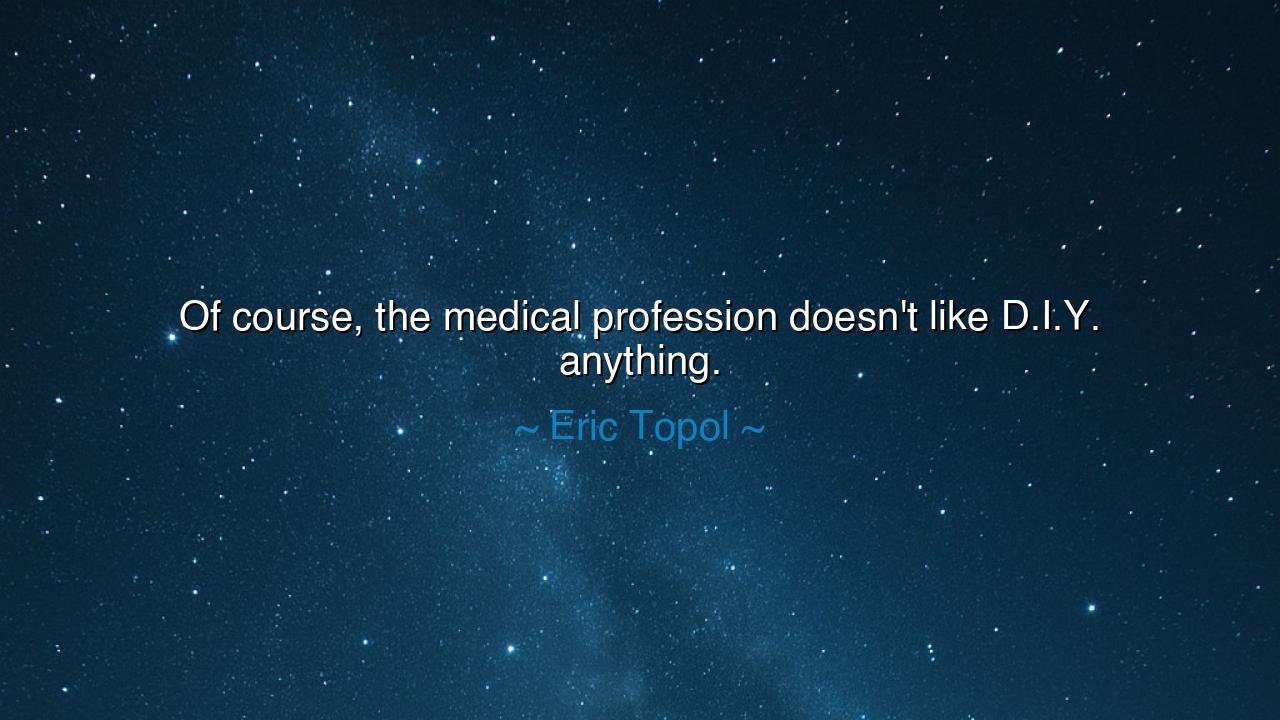
Of course, the medical profession doesn't like D.I.Y. anything.






In the words of Eric Topol, physician, visionary, and reformer of modern medicine, there lies a truth both unsettling and liberating: “Of course, the medical profession doesn’t like D.I.Y. anything.” At first glance, these words might seem like rebellion — a defiance against the ancient authority of doctors. Yet beneath them stirs a deeper wisdom: a call for empowerment, for the awakening of the individual in the age of medicine. For centuries, the healing arts have been guarded like sacred flame, held in the hands of the few who wore the white coat. But now, as knowledge flows freely and technology places power into the hands of ordinary people, a new age dawns — one where the patient begins to take part in their own healing.
Eric Topol, a cardiologist and geneticist, speaks not out of contempt for medicine, but out of love for its true purpose. He has seen how the walls of hospitals, once built to protect the sick, have grown into fortresses that too often separate the healer from the healed. His quote, born from his work in digital health and patient empowerment, reveals an uncomfortable tension — between tradition and transformation, between control and freedom. The phrase “D.I.Y.” — Do It Yourself — is not about arrogance or recklessness, but about reclaiming the sacred partnership between human beings and their own bodies. It is the declaration that knowledge should no longer be locked away, but shared like sunlight, that each person should have the tools to understand and care for themselves.
The medical profession, with its hierarchy and long history, often resists such change. For centuries, the doctor’s word was law — to question it was heresy, to act without permission was folly. Yet history has shown that wisdom grows not through obedience alone, but through curiosity. When the microscope was first invented, many physicians dismissed it as a toy; when anesthesia appeared, others feared it interfered with divine will. But progress, though resisted, always finds a way. So too does this new spirit of D.I.Y. medicine — where patients monitor their own hearts with smart devices, where diabetics use open-source technology to build their own insulin pumps, and where individuals learn to read their own genetic stories.
There is a tale that mirrors this struggle, from the age of explorers. In the seventeenth century, sailors set forth across oceans without maps, guided only by the stars. For generations, navigation was the guarded knowledge of a few scholars and kings. But when the compass became known to the common man, the world changed. The seas were no longer forbidden, and every mariner could find his own way. In the same way, the tools of medicine — once hidden in the ivory towers of academia — are now finding their way into the hands of the people. And like the compass, they grant not recklessness, but direction.
Topol’s quote is not a condemnation of doctors, but a warning to them. He reminds the medical world that control is not care, and that authority without humility becomes tyranny. The true healer is not the one who hoards power, but the one who teaches others to heal. The fear of D.I.Y. medicine arises not because patients are unworthy, but because the system has grown used to dependence. Yet the body belongs to no institution. It belongs to the one who lives within it — to the patient, whose heartbeat, whose suffering, whose will to live cannot be measured by a chart alone.
This revolution of self-care does not mean that doctors are obsolete. Rather, it restores the ancient partnership between healer and patient — one founded on respect and shared knowledge. In the temples of Egypt and Greece, healers once taught the sick to participate in their own cure through ritual, rest, and reflection. Today, through digital medicine and data, we return to that principle in new form. The patient becomes once more a participant in healing, not merely a subject of it. The physician becomes a guide, not a master — a mentor in the art of understanding oneself.
So, my children, let this be your lesson: learn the language of your own health. Do not surrender your understanding to others, even to those who mean well. Listen to your body as you would to an old and loyal friend. Seek the wisdom of doctors, but do not forget the wisdom within yourself. Tools and technology are gifts — but their greatest power lies in how they awaken self-awareness, responsibility, and courage.
For in the end, Eric Topol’s words are a herald of the new age of medicine — not one ruled by walls and white coats, but by collaboration and understanding. The doctor’s art must evolve, and the patient’s voice must rise. The sacred act of healing must once again be shared. Let every person know this truth: that while knowledge can be taught, healing begins within. And when medicine learns to trust the people it serves, and the people learn to trust their own strength, humanity itself will step into a brighter, wiser age.






AAdministratorAdministrator
Welcome, honored guests. Please leave a comment, we will respond soon